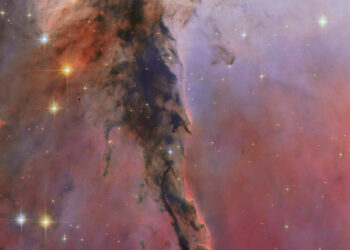The cosmos is a fascinating enigma: only 5% of all mass in existence is comprised of ordinary matter. The remaining composition is 25% dark matter and a staggering 70% dark energy. While dark matter is already an intriguingly elusive substance made of particles that seemingly do not interact with light, dark energy presents an even greater mystery. Scientists are certain of its existence, yet its characteristics continue to defy expectations.
The presence of dark energy is inferred from its influence on the universe’s expansion. Observations indicate that the universe is not only expanding but doing so at an accelerating rate, as evidenced by measurements of distant celestial objects with a constant and known brightness. Dark energy is the theoretical force propelling this accelerated expansion.
However, the current understanding of dark energy is not without its challenges. One puzzling observation is that the force it exerts seems to have varied. In fact, it appeared to have had a greater impact during the early stages of the universe than it does now—a finding that many initially attributed to possible measurement errors since most theoretical models of dark energy assume a consistent value over time.
Contrary to earlier beliefs, new findings from a comprehensive three-year initiative known as the Dark Energy Survey indicate that dark energy may indeed be in flux. This revelation could potentially overturn established physical models of the cosmos.

DESI Collaboration/DOE/KPNO/NOIRLab/NSF/AURA/R. Proctor
The research utilized data collected by the specialized Dark Energy Camera located at the Víctor M. Blanco 4-meter Telescope in Chile, as well as the Dark Energy Spectroscopic Instrument (DESI) mounted on the Nicholas U. Mayall 4-meter Telescope in Arizona. A vast coalition of researchers from around the globe collaborated on this project, which included mapping the universe’s structures in three dimensions, as depicted above.
These discoveries suggest that dark energy is not a static entity but rather one that evolves over time. The research indicates that it was seemingly stronger during the universe’s infancy but has grown weaker in present times. This dynamic nature contradicts the traditional view of dark energy as a constant force, akin to gravity.
“This finding is captivating because it points to potential physics beyond the current cosmological models,” stated Juan Mena-Fernández from the Subatomic Physics and Cosmology Laboratory in Grenoble, France. “If subsequent data corroborate these results, we could be on the threshold of a scientific revolution.”
While researchers remain cautious about completely discarding established cosmological theories, advanced tools like DESI, capable of capturing light from thousands of distant galaxies at once, are refining their comprehension of dark energy. More comprehensive data, alongside theoretical advancements, will help clarify the nature of this perplexing force.
“Our results provide fertile ground for theorists as they explore both new and existing models. We eagerly await their insights,” commented Michael Levi, the DESI director and a scientist at Berkeley Lab. “Regardless of what dark energy turns out to be, it will significantly influence the destiny of our universe. It’s astounding that we can gaze at the cosmos and tackle one of humanity’s most profound questions.”





